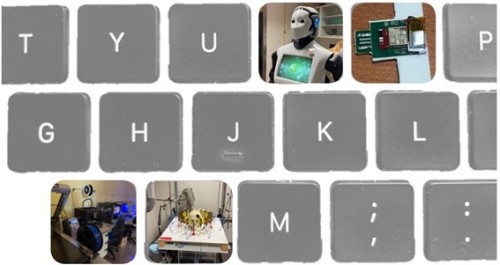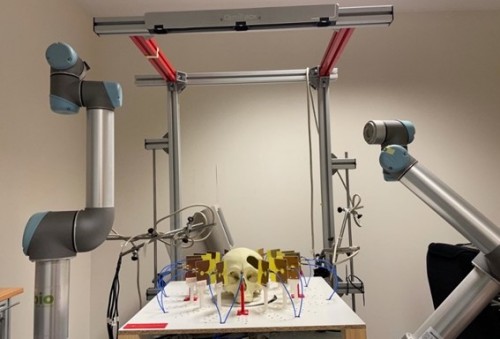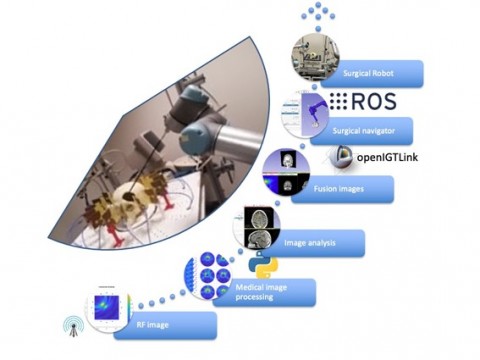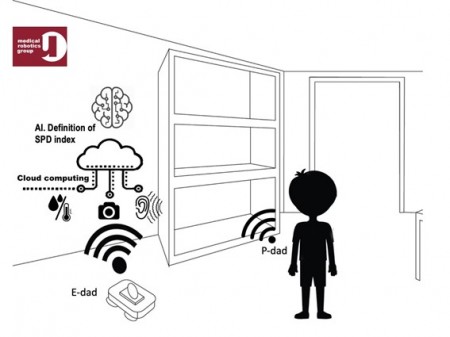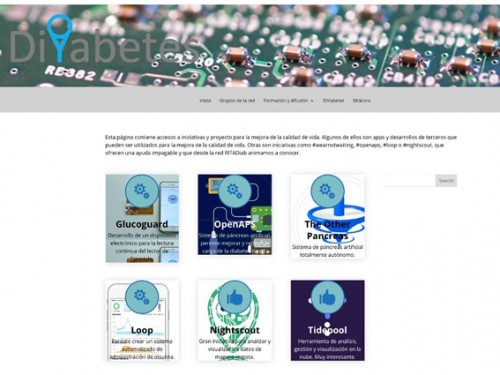Medical Robotics
| Responsible | Jose Maria Sabater Navarro |
| Website | https://medicalrobotics.umh.es |
| @nbioUMH |
RESEARCH SUMMARY
The medical robotics group is a muldisciplinary team dedicated to the development of robotic technology in the field of health and surgery. Experts in the development of wearable electronics for monitoring biometric parameters and in the application of artificial intelligence (AI) techniques for early diagnosis of pathologies and / or the improvement of quality of life of users. In the field of surgery we work on the development of new intraoperative medical imaging systems, based on RF and US, for application to imaging-guided robotic surgery.
Research on nBio – Medical Robotics Group
RESEARCH LINES
Line 1: Surgical robotics
The incredible advances in surgery achieved in recent years have been made possible in part by the inclusion of technology in the OR and the development of new robotic tools that allow the surgeon to carry out his/her work in a more efficient and efficient way. Our motto in this line aims to develop a cooperation between the surgeon and the robotic system that allows him/her to do his work in a better way, achieve new surgical approaches and make efficient use of technology. We have carried out projects to address MIS, SILS, HALS,… and for both abdominal surgery and neurosurgery.
Group’s Surgical Robotics Operation Room
Line 2: Image-guided surgery
The possibility of having both anatomical and functional intra-operation information opens up a range of options for the surgeon to better perform his work. We work on researching new technologies to expand information and show it to the surgeon efficiently. We have performed medical imaging equipment based on RF antennas for both breast scan and neurosurgery. We also researched imaging techniques to show US-Intraoperative on preoperative images.
Fusion images of new RF images for MRI image-guided surgery
Line 3: Wearable health electronics
The joint development of wearable health electronics, capable of acquiring biosignals, and new AI algorithms, capable of inferring clinical information from biosignals is today one of the most powerful tools for early detection and management of chronic diseases. We research in the development of ad-hoc solutions for specific pathologies, such as ASD, epilepsy, parkinson or diabetes. Our work includes electronic design, microcontroller programming, data management and AI development.
Architecture of wearables developed for TEA
Line 4: Diabetes Technologies
Technological development in diabetes has brought about a huge change in the self-management of this chronic pathology. New research on better continuous non-invasive glucose sensors (NICGM), new closed loop control algorithms with new capabilities, new models of glucose-insulin systems or systems to automate carbohydrate counting will further improve this self-management. We researched the development of microwave-based, multifrequency NICGMs that enable the development of AI algorithms for the computation of glycemia. We also do research in the control and development of artificial pancreatic systems (APS).
Dyabetes technology initiative
D. Escobar, J. M. V. Samper, J. M. Sabater, O. A. Vivas
Resolución de localización espacial háptica mediante estimulación eléctrica en la yema de los dedos
Ingeniare. Revista chilena de ingeniería (2021).
V. F. Muñoz, I. Garcia, J. C. Fraile, J. Perez, A. Muñoz, E. Bauzano, I. Rivas, J. M. Sabater
Collaborative Robotic Assistant Platform for Endonasal Surgery: Preliminary In-Vitro Trials
Sensors (2021).
J. M. Vicente, E. Avila, V. Esteve, J. M. Sabater
Intelligent Monitoring Platform to Evaluate the Overall State of People with Neurological Disorders
Applied Sciences (2021).
A. Martínez, C. B., H. García, R. Gutiérrez, G. Torregrosa, E. Ávila, J. M. Sabater
UWB-Printed Rectangular-Based Monopole Antenna for Biological Tissue Analysis
Electronics (2021).
C. G. Juan, E. Bronchalo, B. Potelon, J. Álvarez, J. M. Sabater
Use of Coplanar Quarter-Wave Resonators for Glucose Sensing in Aqueous Solutions
IEEE MTT-S International Microwave Biomedical Conference (IMBioC) (2020).
J. M. Vicente, E. Ávila, J. M. Sabater
Data Acquisition Devices Towards a System for Monitoring Sensory Processing Disorders
IEEE Access (2020).
J. M. Vicente, E. Avila, A. Rodriguez, M. A. C. Lillo, J. M. Sabater
NFC2BLE Communications’ Bridge: From Flash to Continuous Monitoring of Biological Parameters
Elektronika ir Elektrotechnika (2020).
J. Manrique, J.D. Romero, A. Vivas, J.M. Vicente, J.M. Sabater
Modelado matemático de ingestas de alimento e infusión de insulina en un paciente con diabetes tipo 1 en lazo cerrado
Revista Iberoamericana de Automática e Informática industrial (2020).
L. Bolanos, J. M. Vicente, O. A. Vivas, J. M. Sabater
Electrodermal activity in relation to diabetes, autonomic neuropathy and aging: a preliminary study
Ingeniería e Investigación (2020).
A. Muñoz, I. Rivas, J. P. Turiel, V. Muñoz, J. C. Fraile, E. de la Fuente, J. M. Sabater
Integration of a Surgical Robotic Co-worker in an Endoscopic Neurosurgical Assistance Platform
Iberian Robotics conference (2019).
Ibero-American network of technologies applied to diabetes. Funding agency: CYTED Iberoamerican Program of Science and Technology for Development. Duration: 01/01/2020 – 31/12/2024.
PI: Jose Maria Sabater Navarro
Suture evaluation of a robotic system for anastomosis. Funding agency: Ministerio de Ciencia e Innovación. Duration: 01/06/2020 – 31/12/2022.
PI: Jose Maria Sabater Navarro
Non-invasive system for biochemical characterization, component detection, and 3D biomedical reconstruction of biological tissues. Funding agency: Generalitat Valenciana. AVI. Duration: 01/01/2020 – 31/12/2021.
PI: Jose Maria Sabater Navarro
Development of a wellness monitoring system in a rehabilitation clinic environment. Funding agency: Innovative devices for rehabilitation and assistance S.L. Duration: 01/12/2020 – 01/12/2022.
PI: Jose Maria Sabater Navarro
Development and validation of a non-invasive glucose measurement system. Funding agency: Fundacion para el Fomento de la Investigación Sanitaria y Biomédica en la Comunitat Valenciana. Duration: 01/01/2016 – 31/12/2016.
PI: Jose Maria Sabater Navarro

